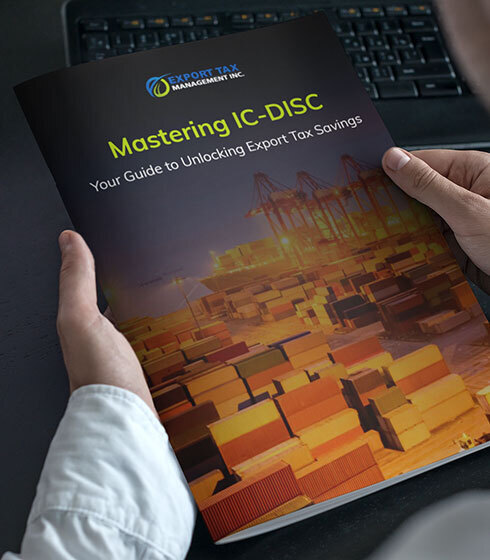IC-DISC and FDII are two export incentives for US-based companies with foreign presences to utilize around tax time. However, they have enough differences that you must know one versus another to select the most optimal tax incentive for your business. What are the differences between FDII and IC-DISC?
IC-DISC and FDII are different in areas of corporate structure and available benefits. For example, FDII does not require companies to create separate US companies like IC-DISC. Additionally, FDII does not apply to S-corporations, only C-corps, unlike IC-DISC tax benefits. FDII tax incentives might also decrease by 2025.
This guide to FDII and IC-DISC will explain both export incentives separately, then compare them and assess their differences. Your corporation will be ready to decide which incentive to apply for.
Overview of IC-DISC and FDII

Your business must understand FDII and IC-DISC before applying for these tax incentives. This overview will provide a definition of both, share some background, and review the eligibility criteria.
Introduction of IC-DISC
IC-DISC, or Interest Charge-Domestic International Sales Corporation, is a type of export tax credit for corporations operating in the United States. This tax incentive allows the registering corporation to defer its taxes until later to reap profits in the interim. Commission payments based on export gross receipts are another feature.
Introduction of FDII
FDII, or Foreign Derived Intangible Income, is a tax deduction for selling products attached to an intellectual property, including patents. When a US company with a US-based IP sells the IP or related products to a foreign customer, the company becomes eligible for a reduced sales tax rate.
We’ll continue explaining how IC-DISC and FDII diverge throughout this article, with plenty of examples and eligibility criteria to guide your decision.
Export Tax Management Inc.’s extensive services include IC-DISC incorporation and compliance. Contact our export tax experts to learn about your IC-DISC options.
Definition of IC-DISC

IC-DISC is a leading export tax incentive for US businesses, but is it right for your company? Let’s review with some information on how it works.
Definition and Background
IC-DISC is a federal tax incentive for US corporations exporting products. US Congress created the incentive in the 1970s as an impetus to expand exports. Corporations that apply for IC-DISC status can enjoy tax deferrals, lower tax liability, and tax-free income on qualifying foreign income.
Congress once limited DISC benefits in the 1980s, but a resurgence in the late 2000s saw IC-DISC tax incentives becoming a valuable means for companies to increase capital gain.
A registering IC-DISC is eligible for a commission payment based on the export gross receipt rate. The commission payments do not accrue federal taxes, and the IC-DISC corporation has less taxable income.
Transferring taxable income into qualified dividends is another trademark of IC-DISC tax rules.
IC-DISC is also largely beneficial, increasing the capital a corporation has access to and granting it more freedom to develop products or grow in other ways. Other perks include reduced reliance on loans and increased international competition.
Eligibility Criteria for IC-DISC
Here is an overview of IC-DISC eligibility requirements:
- You are not a member of a controlled group of foreign sales companies.
- You maintain separate records for the IC-DISC.
- The principal shareholder conforms to the tax year period.
- Up to 95 percent of the assets are inventory for export.
- Up to 95 percent of the gross receipts are for goods produced in the US.
- The value of single-class stocks is at least $2,500.
Tax Benefits for Businesses

An IC-DISC corporation pays its shareholders dividends at a tax rate of 20 percent.
Definition of FDII
Businesses with intellectual property and a foreign presence should consider the FDII export tax incentive. This section will explore the ins and outs.
Definition and Background
Continuing our assessments of IC-DISC and FDII, here is some background on Foreign Derived Intangible Income.
FDII is intellectual property income exported from the US. The US followed a worldwide tax system until 2017 t when the Tax Cuts and Jobs Act introduced a territorial taxation system for corporations.
Under the territorial tax system, profits for multinational corporations in foreign countries do not contribute to the domestic tax base. These are sometimes referred to as participation exemptions.
FDII is calculated by taking the foreign-derived income and subtracting 10 percent from a Qualified Business Asset Investment, or QBAI. The QBAI is the tangible asset value when calculating foreign-derived income earnings.
Eligibility Criteria for FDII

Your corporation must qualify as a C-corporation to apply for FDII. C-corps are separate entities from shareholders and owners for tax purposes and receive corporate income taxes. Secondarily, your corporation must sell IP-related products and generate gross income from exports.
Tax Benefits for Businesses
FDII-eligible corporations can utilize a tax rate of 13.125 percent for every dollar of taxable income. Maximize your FDII benefits with Export Tax Management Inc.’s expert services.
Comparison: IC-DISC vs. FDII
Key Similarities and Differences
IC-DISC and FDII share a few common threads, including:
- Applies to US corporations
- Foreign income is eligible
- Reduces tax payments
However, FDII and IC-DISC are dissimilar in many more ways, such as:
- The corporate structure varies for eligibility, with FDII only permitting C-corporations in the US to apply.
- IC-DISC tax incentives require the formation of a new corporation, whereas FDII allows the organizational structure of a corporation to remain the same.
- You often pay accountant and attorney fees to become a qualifying IC-DISC corporation.
- FDII does not have a manufacturing requirement, but IC-DISC does. The companies must have an export property value of 50 percent that’s exclusively extracted, grown, produced, or manufactured in the US.
- IC-DISC tax benefits work best with distribution to dodge interest charges, whereas FDII doesn’t need any distribution.
- FDII is a newer tax benefit that might be reduced as early as 2025, whereas IC-DISC is longer standing with a surer future.
What Influences the Choice for a Corporation – When to Choose IC-DISC over FDII and Vice-Versa
The biggest determining factor for whether a US-based corporation should select IC-DISC or FDII export tax benefits is eligibility.
Besides that, a corporation might rely on factors like tax benefit rates and the long-term status of the export incentive to influence their decision-making.
A manufacturer eager to reduce its tax rate might seek IC-DISC tax benefits. For example, if the average corporate tax rate is 35 percent per year, a qualified dividend income of 20 percent allows them to save on their taxes by 15 percent.
Here’s an example of FDII. If a company’s QBAI is $9,000 of exports, their FDII is $100, as you can subtract $1,000 of foreign income by a QBAI of 10 percent or $900. The company can take 37.5 of the FDII for taxable income.
Companies may sometimes be eligible for IC-DISC and FDII tax exemptions within the same tax year. Export Tax Management Inc. can help you determine your tax break eligibility.
Compliance and Reporting Requirements
Compliance Guidelines for IC-DISC

Compliance is critical, and IC-DISC corporations must pass QER and QEA tests. QER is short for qualified export receipts and requires a corporation to have a rate of 95 percent export receipts in an average tax year to qualify.
QEA stands for a qualified export asset. The corporation’s export assets must be within 95 percent of the sum of their adjusted asset basis within the tax year.
FDII Reporting and Documentation Obligations
You must document FDII tax incentives in IRC Section 250, Form 8993.
The form requires:
- Gross income
- Exclusions
- Financial services income
- CFC dividends
- Domestic gas and oil extraction income
- Foreign branch income
- Total exclusions
- Deductions
- deemed tangible income return or DTIR
- Gross receipts
- Cost of goods sold or COGS
- Interest deductions
- Experimental and research deductions
Common Mistakes and Pitfalls to Avoid During Tax Filings
Corporations seeking export incentives like IC-DISC commissions and FDII tax breaks should take special care to avoid these errors:
Always file your taxes, even if you’re not eligible to pay taxes for the calendar year.
Triple-check income to avoid underreporting or overreporting mistakes.
Improve recordkeeping to report all your income.
Confirm your math to ensure your calculations are done correctly.
Work with an expert team, like Export Tax Management, Inc.
Book a Consultation for IC-DISC and FDII Now

IC-DISC and FDII incentives on qualifying exports can reduce a corporation’s tax burden, increase available capital, and enable businesses to grow.
The differences between the tax incentives mean that a corporation might be eligible for FDII instead of IC-DISC or vice-versa. Select corporations are even eligible for both tax breaks.
Export Tax Management Inc. has saved over $250,000,000 for its clients and completed over 3,000 IC-DISCs. With 53 CPA firm partners and counting, you can rely on our services and expertise for your taxes.
Contact our tax experts today to discuss your IC-DISC and FDII eligibility.

